The utility cost reduction programme will be available throughout the whole year, including the winter months, Minister of Energy Csaba Lantos announced in a Facebook video on Monday.
The minister stressed that the energy protection system ensures that Hungary offers the cheapest electricity and gas to its citizens up to the average consumption level. According to the minister, there will be sufficient gas supply next year, as the storage levels remained high due to the mild winter months, and Hungary has a particularly large storage capacity at disposal. Existing contracts also guarantee the supply, he said.
Europe and Hungary were fortunate to have a mild winter, but ‘a country’s leadership cannot make an unequivocal bet that this will always be repeated,’ Minister Lantos warned. Therefore, the government has decided to raise the level of the security gas reserve. Previously, the country stored 10 per cent of its annual consumption as a security reserve, which was now raised to nearly 2 billion cubic metres, or 20 per cent of consumption, while consumption decreased.
The minister also emphasised that Hungary needs nuclear energy. Paks 1 operates reliably and safely, and Paks 2 will continue to be developed, he reiterated, stressing that
nuclear energy is a zero-carbon-emission energy source that can help meet climate policy commitments.
Csaba Lantos also pointed out that solar energy is currently the main driver of growth. The total solar power capacity in Hungary is already over 4500 megawatts, which equals two-thirds of the country’s average electricity consumption. There are quarters in a year when, together with Paks, the network can be supplied exclusively with carbon-free electricity. Few countries can boast such data, the minister underscored.
In addition, the instalment of wind turbines will be on the table again, as this alternative is also needed. There are good experiences with utilising geothermal energy, and biogas, biomass, and waste should also be utilised. Finally, the production of existing fossil energy sources, such as oil and natural gas, can be increased to some extent. ‘These are all energy sources that we can produce domestically and thereby serve our energy independence,’ he said.
He acknowledged that there are issues with the water supply network in some part of the country, and separate resources will be required to renovate old pipes. ‘We don’t receive money from the EU for this purpose; we have to provide it from our own budget,’ he said. He announced that the government is planning a significant, ten-year water supply renovation programme, during which the most critical network elements will be replaced. In Hungary, more than 96–97 per cent of the population has access to healthy, drinkable water 24 hours a day, which is something many countries would be proud of, Minister Lantos stated.







